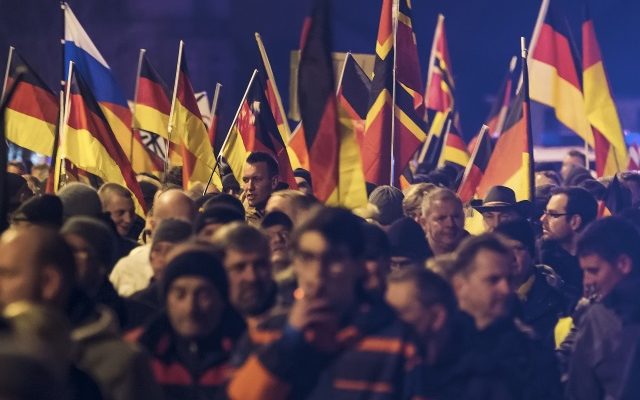German Chancellor Angela Merkel has yet to say whether she will seek a fourth term next year, as is widely expected. While polls this year have shown her popularity slipping from stellar to merely solid, there is no obvious conservative alternative and her bloc is ahead nationally.
A nationalist, anti-immigration party performed strongly in a state election Sunday in the region where German Chancellor Angela Merkel has her political base, overtaking her conservatives to take second place amid discontent with her migrant policies.
The three-year-old Alternative for Germany, or AfD, won 20.8 percent of votes in the election for the state legislature in Mecklenburg-Western Pomerania. Merkel’s Christian Democrats polled 19 percent, their worst result yet in the state.
The center-left Social Democrats, who led the outgoing state government in a coalition with the conservatives, remained the strongest party with 30.6 percent support.
Economically weak Mecklenburg-Western Pomerania, in Germany’s northeastern corner, is home to 1.6 million of the country’s 80 million people and is a relative political lightweight. It is, however, the state where Merkel has her parliamentary constituency, and Sunday’s regional vote was the first of five before a national election expected next September.
National AfD leader Frauke Petry celebrated “a blow to Angela Merkel.” Local AfD leader Leif-Erik Holm told supporters: “Perhaps this is the beginning of the end of Angela Merkel’s chancellorship today.”
Merkel’s refugee policies were a prominent issue in the campaign for Sunday’s election, which came a year to the day after she decided to let in migrants who were waiting in Hungary to travel to Germany — setting off the peak of last year’s influx. Germany registered more than 1 million people as asylum-seekers last year.
New Year’s Eve robberies and sexual assaults in Germany blamed largely on foreigners, as well as two terrorist attacks in July carried out by asylum-seekers and claimed by the Islamic State (ISIS) group, have fed tensions.
Merkel has stuck to her insistence that “we will manage” the refugee crisis, and has also said that “sometimes you have to endure such controversies.”
“This result, and the strong performance of AfD, is bitter for many, for everyone in our party,” said Peter Tauber, her Christian Democrats’ general secretary.
AfD is now represented in nine of Germany’s 16 state legislatures and hopes to enter the national Parliament next year. Still, it fell short Sunday of its aim of becoming the strongest party in Mecklenburg, and also didn’t match the 24.3 percent support it won in another eastern state, Saxony-Anhalt, in March.
There’s no realistic prospect at present of AfD going into government. Other parties won’t deal with it.
The next regional election is Sept. 18 in Berlin, where local issues are likely to play a stronger role.
By: AP




